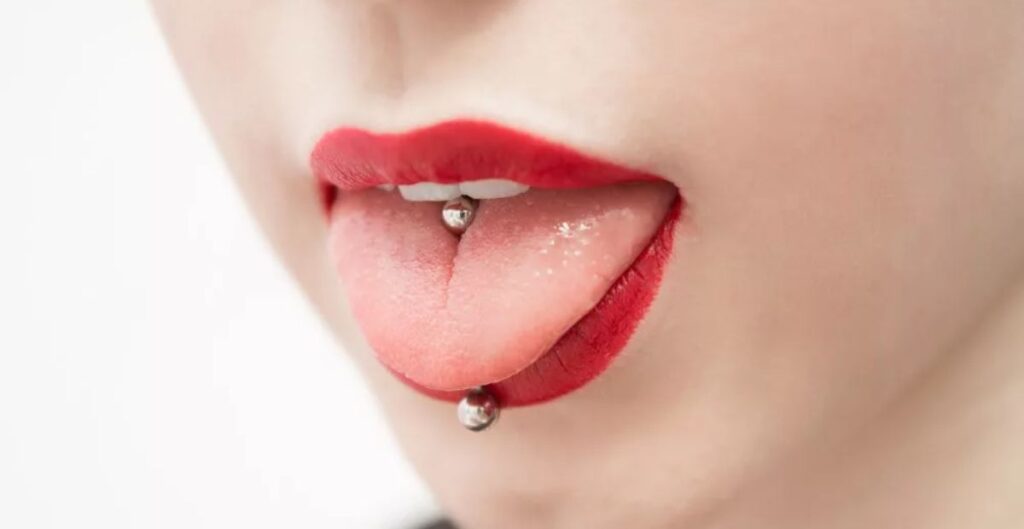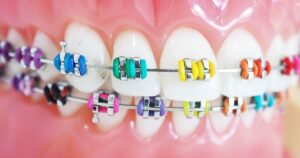Tongue piercings have become increasingly popular, especially among young adults looking to express their individuality. But, many people don’t fully consider the potential risks and downsides before getting their tongue pierced. This article will explore “the ugly truth” about oral piercings that everyone should be aware of.
The Ugly Truth About Tongue Piercings
Getting a tongue piercing may seem like a harmless form of self-expression, but there are numerous ugly truths and dangers that can occur. From excessive bleeding and infections to long-term oral health complications, these piercings pose real risks that shouldn’t be taken lightly.
Bleeding
The tongue is a muscle packed with blood vessels. If pierced improperly or too deeply, it can lead to severe and prolonged bleeding. Jane Doe, a 22-year-old from Chicago, learned this the hard way:
“I figured getting my tongue pierced was no big deal, but I wasn’t prepared for the amount of blood that came gushing out. It was like a horror movie scene in my mouth that just wouldn’t stop.”
Excessive bleeding increases risks of blood loss, swallowing blood which can induce vomiting, and catching blood-borne illnesses if equipment wasn’t properly sterilized.
Infection
With its warm, moist environment and constant intake of food and bacteria, the mouth is a breeding ground for infections if oral piercings aren’t meticulously cared for. Studies show up to 24% of people who get tongue piercings develop some type of infection after.
Common infections include:
- Oral candidiasis (yeast infection)
- Gingivitis (gum disease)
- Abscess formation
- Peritonitis
Untreated oral infections can lead to serious complications like life-threatening sepsis if the infection spreads to the bloodstream.
Nerve Injury
The tongue is full of sensitive nerves that can sustain permanent damage if struck by the piercing needle. Getting your “funny bone” hit causes that zapping electric feeling up your arm; nerve strikes in the tongue can result in:
- Permanent numbness
- Persistent tingling/burning sensations
- Loss of taste
- Hypersensitivity to temperatures
Chipped Teeth
Over time, the constant clacking and rubbing of tongue jewelry against teeth can cause significant enamel erosion and chips/cracks. This not only ruins healthy tooth structure but creates entry points for bacteria that promote tooth decay.
Metal Sensitivity
Just like jewelry worn on skin, some people have allergic reactions or metal sensitivities to the materials used in tongue piercings. This can trigger issues like:
- Rashes and metallic taste in the mouth
- Excessive swelling and inflammation
- Sores, blisters or white lesions
Nickel is a common culprit behind many metal allergies.
Accidental Ingestion
While rare, there are cases reported each year of people swallowing or choking on their tongue jewelry after it became dislodged. This terrifying ordeal happened to over 650 people in 2019 alone. Accidental ingestions occur most often while eating, sleeping or from oral trauma.
Increased Saliva
It’s perfectly normal to experience excessive drooling and saliva flow in the days and weeks after getting a new tongue piercing. This is the body’s response as it tries to flush out the “foreign object” by producing more saliva.
Speech Irregularities
The tongue’s vital role in forming words means tongue piercings can absolutely impact speech and pronunciation. After healing, studs may cause lisps or whistling sounds, while rings allow air to pass through resulting in slurred speech.
Difficulty Swallowing
The piercing process itself causes significant tongue swelling and inflammation that can make it difficult to swallow food or beverages, especially thick or solid items. Swallowing difficulties tend to subside once the initial swelling goes down.
Bad Breath
That new tongue stud provides another surface for food particles and bacteria to accumulate. Without diligent oral hygiene, trapped debris causes foul-smelling breath and promotes plaque buildup around the piercing entry/exit holes.
Related Post: How To Straighten Teeth Without Braces
Tongue Piercing Care Routine

To minimize risks and maintain proper oral hygiene with an tongue piercing:
- Use an antibacterial mouthwash like Biotene or Crest Pro-Health after every meal to flush out bacteria and food debris. Avoid alcohol-containing rinses that can dry out mouth tissues.
- Rinse with warm salt water at least twice daily to keep the piercing clean and reduce swelling/inflammation as it heals. Mix 1 teaspoon of salt in a cup of warm water.
- Brush and floss thoroughly but be very gentle around the piercing to avoid trauma or dislodging the jewelry. Use a soft-bristle toothbrush.
- Use a new tongue brush to softly scrub away any colored or fuzzy matter collecting on the jewelry itself.
- Never touch with hands as this introduces more bacteria. Only handle jewelry with clean hands after washing.
Sticking to this strict oral regimen for at least the first 2-3 weeks is crucial for preventing infections.
Best Tongue Piercing Materials for Sensitive Skin
For those with nickel or other metal allergies and sensitivities, look for jewelry made from:
- Surgical Stainless Steel: Affordable and non-reactive for most.
- Titanium: More expensive but the most hypoallergenic option.
- Niobium: A nickel-free metal that is highly biocompatible.
Avoid rings/studs described as “mystery metal” or containing excessive nickel, which triggers allergic reactions in up to 17% of people.
How to Avoid Infections with Tongue Piercings
Even if you clean regularly, infections can still develop from improper technique, a weak immune system, or not being sized correctly. Signs of infection include:
- Excessive swelling that doesn’t subside
- Yellowish discharge or pus
- Foul odor from the piercing
- Fever, chills or flu-like symptoms
If any of these occur, don’t wait – see a doctor or oral surgeon immediately! Antibiotics or other medical treatment may be needed to prevent the infection from worsening.
Other tips to avoid infections:
- Don’t play with the jewelry by repeatedly sliding it in/out
- Postpone kissing or oral sex until fully healed (at least 6-8 weeks)
- See a reputable, experienced piercer to ensure proper angles/depth
- Consider taking a daily probiotic to boost immune defenses
Tongue Piercing Pros and Cons
Before going under the needle, weigh these pros and cons carefully:
| Pros | Cons |
|---|---|
| Unique form of self-expression | Excessive bleeding risk |
| Seen as spiritually meaningful in some cultures | High infection rates (up to 24%) |
| Believed to enhance sexual pleasure for some | Permanent numbness/nerve damage |
| Relatively inexpensive body modification | Chipped teeth and bad breath issues |
| Long, painful healing process (6-8 weeks) | |
| Difficulty eating, speaking, swallowing at first | |
| Need for impeccable oral hygiene routine |
Tongue Piercing Pain Management Tips
Let’s be real – getting your tongue pierced is going to hurt…a lot! The pain and swelling tends to peak within the first 48 hours. Try these tips to minimize discomfort:
- Use oral numbing gels/sprays 30 minutes before your piercing appointment
- Suck on ice chips or sip ice water immediately after to reduce swelling
- Take ibuprofen or acetaminophen for pain relief as needed
- Eat soft, cold foods like smoothies, popsicles and chilled soups
- Stick to liquids the first day or two if swallowing is too difficult
- Avoid hot/spicy foods that can irritate the wound further
- Get plenty of rest and allow your body to recover
In some cases, the piercing causes so much swelling that it becomes difficult to close your mouth or causes choking by blocking airways. If this occurs, visit an emergency room immediately to prevent asphyxiation.
“That first day, I felt like I had been beaten up and was basically drooling all over myself. I wanted to give up on the tongue ring, but powered through and I’m glad I did!” – Michelle, age 29
While dealing with temporary but intense pain and denying yourself certain foods for several weeks is tough, many feel their new tongue piercing is ultimately worth the struggle.
However, considering the various risks, infections, and permanent oral health impacts outlined in this article, carefully weigh whether getting your tongue pierced is truly the right decision for you. If choosing to go through with it, strictly follow all aftercare instructions from your piercer.
For anyone interested in getting a tongue or other oral piercing, this resource from the American Dental Association provides trustworthy guidance to minimize dangers.
FAQs
What Are The Risks Associated With Tongue Piercings?
Risks include infection, swelling, chipped teeth, and difficulty speaking or chewing, among others.
How Do Tongue Piercings Affect Oral Health?
Tongue piercings can lead to gum recession, tooth damage, and increased bacteria accumulation, potentially causing oral health issues.
What Complications Can Arise From Tongue Piercings?
Complications may include infection, swelling, bleeding, nerve damage, and allergic reactions to metal jewelry.
How To Properly Care For A New Tongue Piercing?
Proper care involves rinsing with non-alcoholic mouthwash, avoiding alcohol and spicy foods, and gently cleaning the area with saline solution.
Can Tongue Piercings Cause Nerve Damage?
Yes, tongue piercings can potentially cause nerve damage, leading to numbness or altered sensation in the tongue or mouth.
Why Do People Get Tongue Piercings?
People may get tongue piercings for aesthetic reasons, self-expression, cultural significance, or personal preference.
Summary
Tongue piercings may seem fashionable, but they pose serious risks. Complications include infection, swelling, chipped teeth, and nerve damage, leading to speech and chewing difficulties. Poor oral hygiene with piercings can cause gum recession and tooth damage due to increased bacteria. Tongue piercing care involves non-alcoholic mouthwash and avoiding alcohol and spicy foods. Despite these risks, people choose tongue piercings for aesthetic reasons, self-expression, or cultural significance, unaware of the potential long-term consequences on their oral health.








